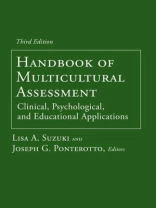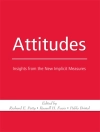Handbook of Multicultural Assessment offers the most
comprehensive text on testing of racial and ethnic minorities in
the United States. This thoroughly revised and updated edition
includes the most current and state-of-the-art assessment
information in a variety of psychological and educational
domains. The book highlights new and innovative testing
practices and expands the populations of interest to include recent
immigrants and refugees. It also includes ways to overcome barriers
in the assessment process as well as forensic assessment. This
important resource offers an instructional text for conducting
culturally competent psychological assessment for clinicians,
educators, and researchers.
Innehållsförteckning
Preface.
The Editors.
The Contributors.
PART ONE: GENERAL ASSESSMENT ISSUES.
SECTION ONE: GENERAL MULTICULTURAL ASSESSMENT ISSUES.
1. Issues in Culturally Appropriate Psychoeducational Assessment (Amado M. Padilla and Graciela N. Borsato).
2. Multicultural Assessment Validity: The Preeminent Ethical Issue in Psychological Assessment (Charles R. Ridley, Michael L. Tracy, Laura Pruitt-Stephens, Mary K. Wimsatt, and Jacquelyn Beard).
3. Building Community Test Norms: Considerations for Ethnic Minority Populations (Robert G. Malgady and Gerardita Colon-Malgady).
4. Cultural Identity, Racial Identity, and the Multicultural Personality (Alan W. Burkard and Joseph G. Ponterotto).
5. Acculturation and Multicultural Assessment: Issues, Trends, and Practice (Lourdes M. Rivera).
6. Multicultural Issues in Computer-Based Assessment (Muninder K. Ahluwalia).
7. Clinical Diagnosis in Multicultural Populations (Richard H. Dana).
8. A Cultural Assessment Framework and Interview Protocol (Ingrid Grieger).
SECTION TWO: ASSESSING IMMIGRANTS AND REFUGEES.
9. Considerations for the Cross-Cultural Evaluation of Refugees and Asylum Seekers (Judy B. Okawa).
10. Cultural Adaptation and Translation of Assessment Instruments for Diverse Populations: The Use of the Harvard Trauma Questionnaire in Rwanda (Mary Fabri).
11. Delivering Quality Mental Health Services to Immigrants and Refugees Through an Interpreter (Maria Prendes-Lintel and Francisca Peterson).
SECTION THREE: DAILY LIVING ASSESSMENT.
12. Assessment of Diverse Family Systems (Daniel T. Sciarra and George M. Simon).
13. Culturally Competent Vocational Assessment with At-Risk Adolescents in Middle and High School (Margo A. Jackson, Aisha M. B. Holder and Morgan T. Ramage).
14. Cross-Cultural Considerations in Quality-of-Life Assessment (Shawn O. Utsey and Mark A. Bolden).
PART TWO: TESTING ISSUES.
SECTION ONE: PERSONALITY ASSESSMENT.
15. TEMAS: A Multicultural Test and Its Place in an Assessment Battery (Rosemary Flanagan, Giuseppe Costantino, Elsa Cardalda and Erminia Costantino).
16. Multicultural Issues in Projective Assessment (Giselle B. Esquivel, Geraldine V. Oades-Sese and Sarah Littman Olitzky).
17. On the Multicultural Utility of the 16PF and the CPI-434 in the United States (Kristen M. Strack, Marcella H. Dunaway and Stefan E. Schulenberg).
18. Multicultural Applications of the Myers-Briggs Type Indicator (Mary H. Mc Caulley and Raymond A. Moody).
19. MMPI-2 and MCMI-III Performances of Non-White People in the United States: What We (Don’t) Know and Where We Go from Here (Kwong-Liem Karl Kwan and Michael Lynch Maestas).
SECTION TWO: ASSESSMENT OF COGNITIVE ABILITIES.
20. Ability Testing Across Cultures (Robert J. Sternberg and Elena L. Grigorenko).
21. Educational Assessment of English-Language Learners (Graciela N. Borsato and Amado M. Padilla).
22. Multicultural Issues and the Assessment of Aptitude (Lisa A. Suzuki, Lorelei Prevost and Ellen L. Short).
23. Academic Achievement Testing for Culturally Diverse Groups (Craig L. Frisby).
24. Neuropsychological Assessment in a Multicultural Context: Past, Present and Future (Arthur Mac Neill Horton).
25. Family-Oriented, Culturally Sensitive (FOCUS) Assessment of Young Children (Paul J. Meller and Phyllis S. Ohr).
26. Assessment Issues for Working with Diverse Populations of Elderly: Multiculturally Sensitive Perspectives (Amanda L. Baden and Grace Wong).
SECTION 3: FORENSIC ASSESSMENT.
27. Assessing for Child Maltreatment in Culturally Diverse Families (Lisa A. Fontes and Margarita R. O’Neill-Arana).
28. Competency to Stand Trial: A Multicultural Perspective (Sergei V. Tsytsarev and Amanda Landes).
29. Multicultural Assessment: Trends and Future Directions (Lisa A. Suzuki and Joseph G. Ponterotto).
Name Index.
Subject Index.
Om författaren
Lisa A. Suzuki is Professor in the Department of Applied Psychology at New York University and a leader in the field of multicultural assessment, training, and qualitative research methods. She is author or coauthor of numerous publications in the field, serves on the editorial board of the Journal of Multicultural Counseling and Development, and is active also in the field of Asian counseling. Professor Suzuki lives in NYC with her husband and daughter.
Joseph G. Ponterotto is Professor of Education at Fordham University.












